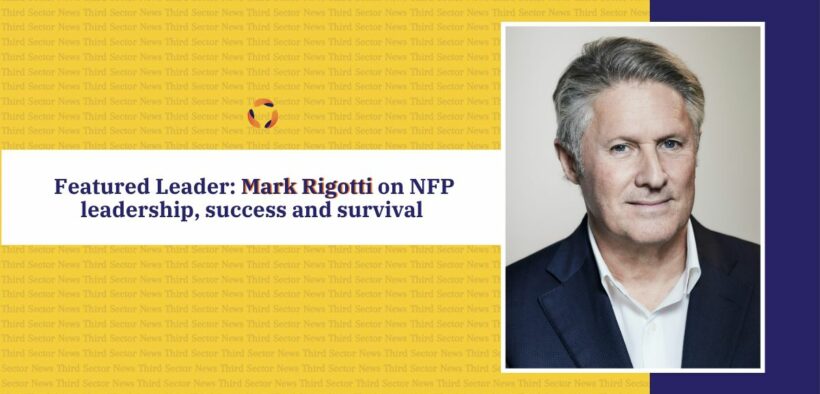Every year, the Australian Institute of Company Directors (AICD), an independent membership-based organisation offers a wide array of programs and courses encompassing the principles of corporate governance and their practical implementation in various sectors and industries.
Third Sector spoke to Mark Rigotti, AICD Managing Director and CEO about his leadership strategies and how important a legal structure is to a NFP’s survival and success.
- Which leadership strategies do you believe had the greatest impact on you and your team?
A couple of strategies spring to mind – although part of leadership is always being open to and seeking out learning and improvement so this is not a static position.
I am a fan of “enterprise leadership”. This involves leading teams to ensure the performance of the team today while also preparing for tomorrow and changing as required for your best guess at the future state you will be leading in. You have to operate at those two speeds – Performing Today and Transforming for Tomorrow. It also involves leading your immediate team, which is a “vertical” dynamic, while contributing to the broader organisation across teams – a more “horizontal” dynamic. The enterprise mindset is really important as most of us develop via more senior roles within the same vertical grouping.
At the AICD, we seek to infuse this enterprise leadership strategy across our teams to deliver better outcomes for our members and the stakeholders we serve.
Another strategy involves “Zooming In and Zooming Out”. This is a conscious ability to zoom into the detail of an issue, standing side by side with team members without micro-managing them. And also being able to zoom out and take a broader, more long-term and strategic view on an issue, project or situation. The context will determine the response. The trick is to have the skills to do both and the ability to choose when to Zoom In and when to Zoom Out.
Finally, we are focused on trying to simplify what we do and how to do it at the AICD – that extends into our leadership approaches and requires us to empower our teams to achieve the simplification objective.
- What are some of the challenges you’ve encountered as CEO of the Australian Institute of Company Directors?
The size and diversity of the AICD membership are what make the Institute strong. The AICD continues to be the largest director institute in the world by member numbers. This is a testament to the commitment of Australia’s director community to professional development. Members recognise that the AICD’s education programs are world-class and look to the Institute to support their capability-building throughout their careers. This means we must constantly review and evolve our curriculum and policy agenda as new challenges and opportunities emerge for directors.
There’s no doubt that with membership this large and diverse, deciding exactly where to set the needle on public policy issues is not an easy task.
At the same time, the regulatory environment has never been more complex or demanding for directors, with an increasing array of stakeholder interests and expanded non-financial, as well as financial disclosures required of boards. This is impacting significantly on many in the NFP sector.
As the task of the director becomes more complex, the primary role of the AICD is to continue to ensure our members are equipped for the challenges that they face on their boards. On the policy and practice front, we continue our focus on critical areas of governance to support our members by advocating for policy reform, providing practice guidance and building knowledge of key areas.
The AICD has maintained an active role in the debates around climate change and broader sustainability reporting, produced the Cyber Security Governance Principles, and worked as part of a stakeholder coalition that saw governments across Australia commit to harmonised NFP fundraising laws.
We seek to help our members and directors navigate complexity.
I’m really passionate about how, through our work, the AICD can improve the governance of organisations across the country and the team is working hard to make sure we support our members with practical offerings.
- Why is the legal structure of a not-for-profit organisation vital to its success and survival?
There is significant legal and regulatory complexity in Australia with establishing and running an NFP – the AICD has been a long-term advocate of simplifying some of these laws. Some improvement is in sight with proposals to harmonise fundraising laws around Australia.
An NFP can be incorporated under state-based laws or alternatively the Corporations Act.
Further, there are additional complexities if the organisation seeks to be registered as a charity, including defining its charitable purpose and additionally seeking deductible gift recipient status from the ATO.
A Board of an NFP should be alive to the different options for establishing an NFP and the particular regulatory complexities they may bring. Ideally, this would be considered at the establishment of the organisation and be consistent with the purpose of the organisation and what it is looking to achieve. Directors should also be aware of how different structures will impose different obligations on them personally.
The AICD has consulted extensively with NFPs to develop resources for directors of NFPs to assist them in understanding their obligations and navigating complexity.
- How does economic, social, and financial insecurity impede an organisation’s ability to practice good governance?
The effective governance of an NFP is impacted detrimentally over time when an organisation’s ongoing survival is always under pressure. Rather than focusing on the strategic long-term direction of the organisation and ensuring it is pursuing its purpose, a Board will inevitably be drawn into seeking short-term funding and resources and may even be personally asked to financially contribute to the organisation.
A stable operating and financial position for an NFP is central to it being impactful, recruiting and retaining talented staff and having effective governance.
“Profit” enables NFPs to pursue their Purpose.
- What does the future of AICD look like to you?
Organisations thrive when their purpose and how they achieve it is intuitively obvious to all stakeholders — customers, members, staff, communities and shareholders. Our role as directors and organisational leaders is to think deeply about the underlying challenges our organisations face, stare into that complexity, and provide the clarity for our people to meet and fulfil the organisational mission.
The pandemic was difficult for us. As a membership body, fostering connection is fundamental and this became much harder during the waves of lockdowns and the associated uncertainty. We know that meeting in person is important for our members to build lasting connections and we have ramped up our face-to-face offerings.
It can’t be denied that the pandemic was also critical in alerting all of us across every aspect of business – big, small, for-profit, not-for-profit, volunteer and the public sector – as to how important the digital economy is to our operations and remaining connected in the modern world. I’m pleased to say that AICD is undergoing a major digital transformation that will facilitate us in performing every aspect of our business to a higher standard.
- Is there anything you would like to add or highlight?
A highlight is the work the AICD consistently does with and for not-for-profit directors and their organisations. We provide education, guidance, regulatory updates, and resources, and we advocate in the interests of the sector – which represents a significant and highly valued part of the AICD membership.
For instance, the implications of climate change for Australia’s 600,000 NFPs are profound and AICD director surveys show a majority of NFP directors want to engage more on climate governance. But the challenges can often seem overwhelming. This has informed our recently released NFP Climate Governance guide Climate Governance for NFP Directors: Starting the Journey to Net Zero which is a dedicated resource to assist not-for-profits navigate the increasing demands of climate change risk and governance.
The burden of compliance more generally also falls heavily on not-for-profits, where resources may be diverted from core operations to meet regulatory requirements. Leaders in the aged care sector, for example, have cited the increased cost of complying with the new regulation — although well-intentioned— as one of the factors forcing the closure of some facilities.
We have consistently cautioned against the corrosive effect of ‘regulation creep’ or regulatory accumulation, and the need for the left hand of regulation to know what the right hand is doing, to ensure that organisations are not crushed under the cumulative weight.
At the heart of the AICD’s purpose and mission is the commitment to be the independent and trusted voice of governance. The AICD aims to build the capability of a community of leaders.
In the wake of the COVID pandemic, we all faced the challenge of rebuilding the sense of connection across our workforces and stakeholders, and in the case of the AICD, our membership. There’s been some catching up to do, but it’s gratifying to say that we’re definitely getting there.
Related: AICD welcomes new Director to the National Board
Menchie Khairuddin is a writer Deputy Content Manager at Akolade and content producer for Third Sector News. She is passionate about social affairs specifically in mixed, multicultural heritage and not-for-profit organisations.


































































































































































